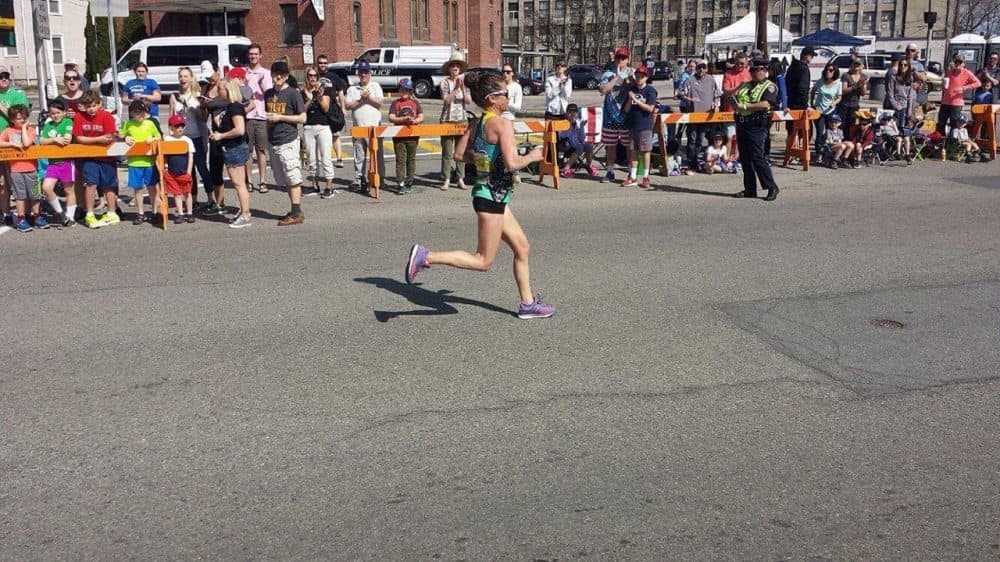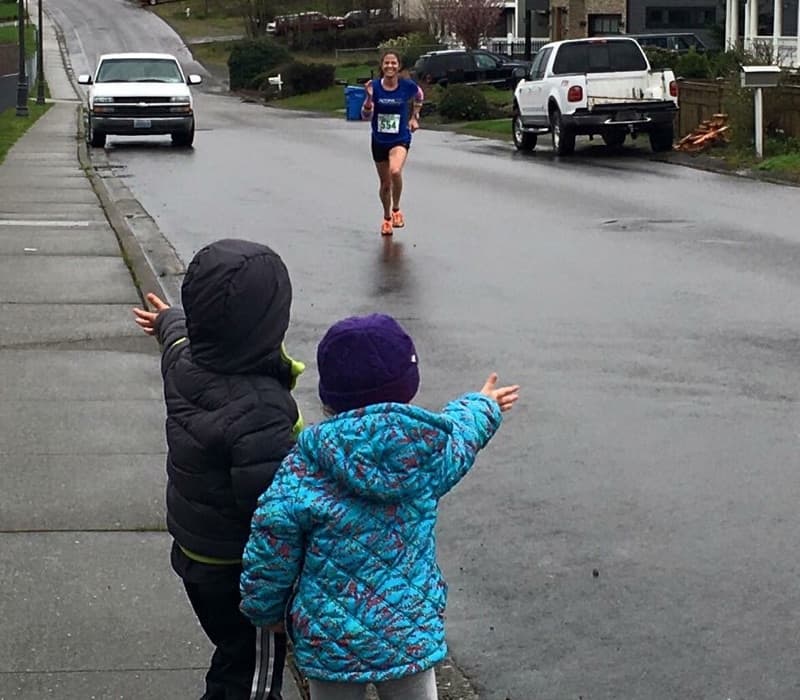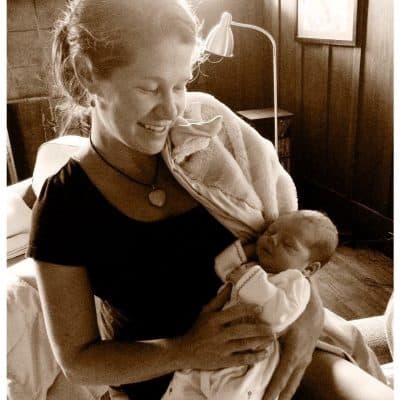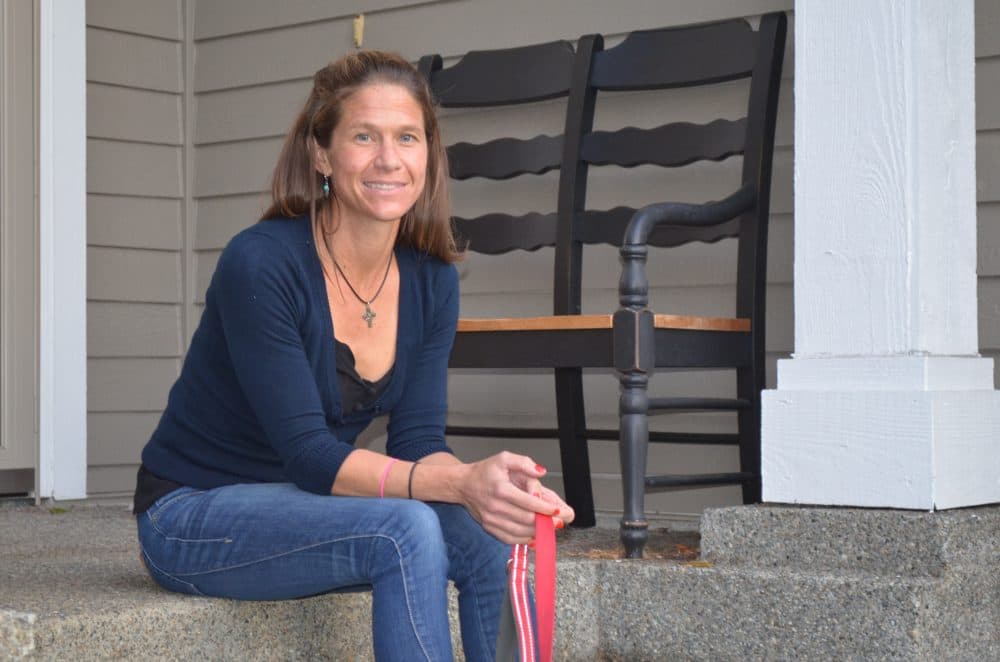Advertisement
Kate Landau Runs Toward Healthier Times
Resume
Kate Landau grew up in upstate New York, in a little town in the Catskill Mountains.
"I was a pretty free spirit, you know. Funny kid, apparently," she says.
That all changed when Kate started running.
"Running brought out the perfectionist in me," she says.
It started in junior high, when a softball coach noticed how fast Kate could run the bases and told her she should try out for the cross-country team. She was good — really good — right away. In seventh grade, she came in second in the New York state meet. Newspapers called her a "phenom."
She says she didn’t feel like a free spirit anymore.
"I always had this fear that somebody was going to catch up to me," Kate says.
Kate noticed other female runners hitting puberty and dropping off the radar. She didn’t want that to happen to her.
'I Was Going To Keep My Body The Size That It Was'
Then she went to the cross-country Junior Olympics in Reno, Nevada. All the athletes stayed in a hotel together and spent the evening hanging out.
"One of the cross-country runners — who was like four years older than me, and I had a crush on him — he called me hefty. Or beefy. Beefy was the word," Kate says. "That was just another encouragement for me to be smaller."
Kate says that’s the moment she decided to do whatever she could to delay puberty.
"And I was going to keep my body the size that it was, which was 70-something pounds and 5-foot-1, I think, in seventh grade," she says.
Kate started obsessing about her weight.
Her parents made her go to therapy, but she cheated on her weigh-ins and threw tantrums when anyone tried to make her eat more.
And so she did manage to delay puberty: When she was in high school, she took hormone pills in order to finally start her period.
And she also managed to stay fast — fast enough that Georgetown University offered her a full scholarship to run on their cross-country team. Her sophomore year, she became their top runner.
She told a New York Times reporter she had recovered from anorexia and she was happy. But neither of those things was true.
"My mental status was mostly depressed if I wasn’t having success in running," Kate says. "Running was my identity. The eating disorder was what I believed would keep me running fast. And then the depression was just associated with the ups and downs of success."
And because of her anorexia, Kate had fragile, brittle bones.
"I had, you know, close to osteoporosis — the bone density of a 60- or 80-year-old when I was 18," she says.
That meant she was susceptible to stress fractures.
"I would train for eight weeks, get in good shape and then got injured again," Kate says. "It was like eight weeks on, eight weeks off, eight weeks on, eight weeks off."
Kate often raced on broken bones. Heading into cross-country nationals her fourth year of college, she had a tibial stress fracture.
"Or it could have been a fibula — or a tibia and a fibula," she says. "I had so many. I just can’t even remember."
Either way, Kate still raced. She was projected to finish in the top three.
"I took a bunch of Aleve before. I was in second place for much of the race," she says. "Then I got passed in the last, like, half-mile by a bunch of people, and I remember flying home and just being in agony."
'I Just Needed To Get Away'
The following year, 1999, was Kate’s final year of college. Before her last collegiate race, she was projected to be All-American for the sixth time. But she was one of the last to finish.
"I just decided after that race that I just couldn't do it anymore," she says. "I just needed to get away and start over and start fresh where nobody knew me, and so that's when I moved from D.C. to California."

Kate started school to become a physician's assistant. She took up cycling. It’s not that she didn’t want to run.
"I still missed it, I still loved it, I still wanted to be that runner," she says. "I still identified myself as a runner."
So, every once in a while, Kate tried to go for a run. But she’d always start fast, at pretty high mileage, and get injured within a week or two. Her bones couldn’t hold up to the pounding.
"I completely gave up the idea of me ever competing again, really," she says. "I never thought I would compete again. My sister was having great success in marathons, and she ran in the Olympic trials marathon, and I was jealous, but I didn't think that that was something that I would be able to do. Never thought my body would be able to withstand training or running that much."
When Kate was in college, she logged about 100 miles every week and a half. After college, it took her a decade and a half to log that many miles.
But that doesn’t mean she wasn’t exercising. She’d go to the gym for an hour every morning and then ride her bike for a few hours every night.
"Putting in two to five hours a day of exercise, so that's kind of who I became: this just crazy exerciser," she says. "That was my identity at that point."
Ready For Rest And Recovery
That went on for years. Then, in the winter of 2011, when Kate was 34 years old, things got even worse.
"My body just started to break down. I couldn't even go for a half-hour ride," she says. "I was going to go for a vacation to the Grand Canyon, go hike that, and it ended up I just canceled that trip and stayed in bed for like 10 days."
Kate says she spent that time watching "Scrubs" and crying under the covers. She says she was suffering from complete exhaustion and severe depression.
"I have always been someone who's had a lot of energy," Kate says. "So being in bed for so many days was something that was foreign to me and something that made me feel, finally, really sick. Something was really wrong with my body."
Kate says she decided she was going to get better.
"I had been through short bursts of therapy in the past, when I was forced to do it, but I think I was just ready for therapy at that point," she says. "I was just such, like, 'Help me.' "
Kate started taking antidepressants. And she stopped exercising.
"I think that's a really critical part of getting better from an eating disorder, is just letting your body rest and recover, and not doing any exercise at all, and getting the nutrition in and letting your body realize that you're not starving it or abusing it anymore," she says.
"It was just amazing to me that I could do it and not hurt. And I could run five times a week, six miles or whatever it was, and not hurt."
Kate Landau
Kate spent all her time outside of work going to her therapist, her doctor and her nutritionist. Her body started to heal. That summer, at the age of 34, she got her period naturally for the first time in her life.
'I Need To Take Care Of Myself For Her'
Kate says she’d always before been focused internally — on her own eating, exercise and weight. That summer, she started to focus on other people, too. She fell in love.
"I did not think I had the possibility of getting pregnant," she says. "I figured I was barely getting my period for a couple months, and that it wasn’t going to be possible. And then I got pregnant in November."
But, given her medical history, she was really worried she’d lose the baby.
"I would take a pregnancy test every couple days to make sure that I was still pregnant," Kate says.

Kate’s baby girl was born in July 2012. She named her Grace.
"She — it just puts everything in perspective and has made my priorities not about me," Kate says. "They're about her. Being, like, 'I need to take care of myself for her, because I need to set a good example for her. I need to be around for her. I need to have energy so I can play with her.' "
Kate’s recovery was not completely linear. She went through a few dark months when Grace was an infant. She was unemployed and moved back in with her parents in upstate New York. She says her eating disorder started to come back.
But, when Grace was about 1 year old, Kate got a job in Tacoma, Washington, near where her older sister lives. So she and her baby moved.
"That's when I started running again," she says.
Kate would put 1-year-old Grace in the jogging stroller.
"My problem in the past had been always trying to run fast as soon as I started, and the stroller slowed me down," she says. "She was a baby who wanted to be in my arms at all times, so that was the only time that I had my arms free of a baby. And then it was just amazing to me that I could do it and not hurt. And I could run five times a week, six miles or whatever it was, and not hurt."
'Maybe I Can Race Again'
Kate says she had no plans to race. But, that fall, her sister invited her to do a Turkey Trot 5K.
"And I was just like, 'OK, let's do this with my sister,' kind of thing," Kate says.
Kate raced pretty well — a lot faster than she’d expected.
"That was the first time I was like, 'Oh, wow, maybe I can, you know, race again,' " she says.
Kate gradually upped her training, but she didn’t take it too far this time, and she made sure to get enough nutrition. She ran her first half-marathon and then her first marathon.
She’s now considered an elite runner. She’s part of a professional team and has sponsors.
Kate’s still a perfectionist about her running, but in the normal way every runner I know is.

I wrote to her to ask how the California International Marathon went in early December, and she wrote back:
"It did not go well. … I went out too fast and died hard. ... I qualified for the 2020 Olympic Trials, which is cool, but I am frustrated with how I ran."
But, overall, Kate says she’s happy.
"I was reborn," she says. "I mean, things have not been perfect. There's been some ups and downs, but I feel so, so, so blessed. And it's just been like a different life. I’m so grateful to be where I am now."
This segment aired on January 13, 2018.